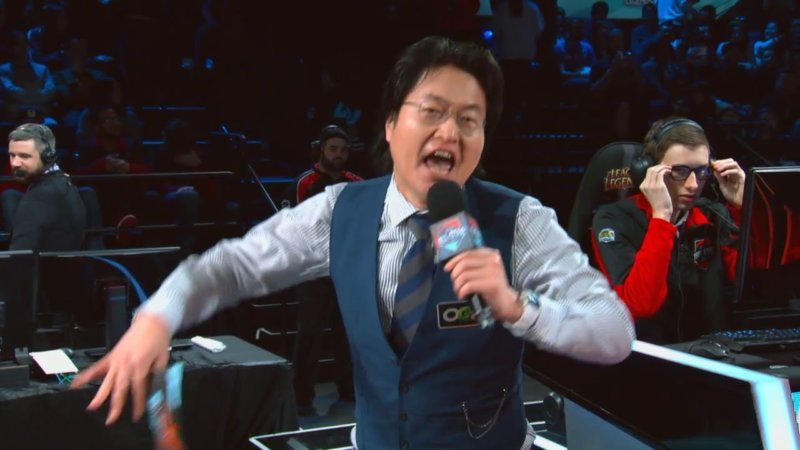New Esports Casters: Are They Game-Changing or Game-Breaking?
Following a packed summer period of esports tournaments, a debate opened up regarding the nature of modern-day esports casters. In particular, the discussions targeted so-called ‘hypecasters’ and their seemingly incessant desire to over-hype any situation, no matter how mundane, just to earn a few seconds in the social media spotlight. For years – over a decade, in fact – esports casters have been under scrutiny by the community at large.
If you’re any kind of a sporting fan, you’ll understand the importance of the commentator. Since the turn of the 20th Century, sports commentators have added a much-appreciated edge to competitive events. They may bring to the table a blow-by-blow account, analytical information, or, yes, a burst of ‘hype’ when a key event happens in a game. However, following a message posted on Twitter by Jason ‘Alchemister5’ Baker, a debate opened up as to the ‘validity’ of young, over-hyped esports casters.
‘If Everything Is Hype, Nothing Is’
As the esports industry has grown, so too has the pool of esports casters pursuing a career in esports. Once upon a time, the esports caster was a fledgling role, ill-informed and on hand purely for the novelty of having one. Now, esports casters are an integral part of the process; the voice that can make or break a situation on stream, aiding viewers with their own account of what’s going on. For the newer viewers, a top-tier esports caster can offer a valuable insight into the fixture. For veteran viewers, a bad esports caster can be a quick ticket to the mute button, even at the biggest esports tournaments.
Firstly, it’s important to stress that it isn’t just ‘over-hyped’ hypecasters that seem to be causing a problem here. For years, the esports community has taken an issue with casters straying from their lane. There are a few different ‘types’ of caster, such as analytical, play-by-play (PbP), and then the loud, brash hypecasters. Should a run-of-the-mill play-by-play caster act like they ‘know it all’, stepping into the analytical role, it can sometimes be taken in a negative light.

Hype. (Image credit: YouTube – EpicSkillshot)
But what we’re here to look at today is the issue with younger casters – or any casters, for that matter – overhyping even the most mundane situations. In a world so densely packed with hundreds of tournaments and what seems like thousands of esports casters, every one of them seems to want to land that next clip that’ll see them skyrocket on social media. However, as Jason Baker suggests, this could be down to a lack of mentorship, and by association, a lack of understanding of how things should flow.
This was a sentiment mirrored by Leigh “Deman” Smith, an esports commentator with years in the business, and a certified legend in the League of Legends scene:

Addressing The Problem
With today’s trends, it always seems that louder is better, and platforms like Twitch and YouTube tend to thrive off the brash, confident, hyped-up creators. It’s not a new concept by any means, as we can go back ten years and watch the situation unfolding – ‘ragey’ gamers, teenagers screaming at their screens, gesticulating wildly as they live out the most inane situations imaginable.
As the esports industry matures, it’s becoming much more professional and way more organised. This extends to the vertical that houses esports casters, whether they’re a League of Legends caster or the voice of the Call of Duty League. For the most part, the more experienced caster understands the ebb and flow of the game; they know when to build tension, and they know when to explode in a burst of passion.
However, the younger casters are coming in from a generation of gamers raised on the loud creators. They’re under the impression that everything needs to be fast, powerful, punchy, and in your face. It could be a simple case of the more experienced casters taking younger esports casters under the wing and offering them a little mentorship, but it’s a fast-growing space, and there are thousands of aspiring casters.
For now, it’s a concern that is impacting the community at large, if social media comments are anything to go by:
It’s important to stress that this is a debate that can be traced back to the earliest foundations of the esports industry. Ultimately, there’s no way to please everyone, and at every given moment, someone out there will have an issue with how an esports caster calls a game. It’s all well and good raising the point, but at the end of the day, we need to ask, ‘what can really be done?’

 LOL
LOL CS:GO
CS:GO Dota 2
Dota 2 Valorant
Valorant Fortnite
Fortnite Overwatch
Overwatch StarCraft
StarCraft Call of Duty
Call of Duty






















 EN Global
EN Global  BR Português
BR Português